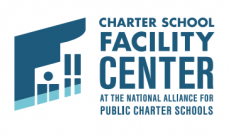Philanthropic foundations have sought to improve financing options for charter schools through a variety of measures ranging from direct grants to schools to program-related investments in the form of guarantees or low-cost loans to CDFIs. Some foundations have turned to supporting new funds. One example is a relatively new nonprofit loan fund described below.
The Equitable Facilities Fund (EFF), established in 2017 with support from the Walton family, is a national social impact fund that combines philanthropic funds with private capital to provide charter schools with fixed-rate, long-term loans, typically 30 years. The fund’s pricing is lower than market rate tax-exempt bonds because the below-market rate philanthropic capital is used to blend down interest rates. Mirroring the tax-exempt market, schools can prepay the EFF loans after a ten-year call period. Also similar to the bond market, EFF provides schools with the ability to finance 100% of projects costs, requiring little or no up-front equity from schools. Unlike the bond market, EFF does not currently charge any underwriting discount and does not require funding of a debt service reserve fund, both of which help lower the all-in cost for schools. Also unlike the tax-exempt bond market, EFF can execute advance refundings.
Charter school stakeholders have created a new long-term financing option that leverages philanthropy to blend down borrowing rates.
In the period between its establishment in 2017 and the end of July 2020, EFF closed $297 million in long-term loans to 21 charter school borrowers in eleven states. In August 2019, the fund issued $112 million in tax-exempt bonds through its Equitable School Revolving Fund, and in August 2020, the fund issued an additional $171 million. EFF employed the bond proceeds—in combination with philanthropic capital—to finance these loans. EFF plans to provide a total of $700 million in long-term loans to charter schools across the country by the end of 2021, funded with $500 million in tax-exempt bond issuance and $200 million in philanthropic capital.
Eligibility
EFF financing may be used to refinance existing debt or to finance construction, acquisition of land or facilities, and expansion projects. Like the bond market and Idaho’s moral obligation program, combination financings—which include both new money and refinancing uses—are possible. Loans are secured by a first lien on the real estate collateral and revenues of the borrower or related entity. Loan size is limited based on certain portfolio guidelines, which currently cap individual loans at approximately $30 million. Eligibility for financing is restricted to nonprofit charter schools or charter management organizations that meet the underwriting criteria below:
- Three years of operating history
- Demonstrated track record of academic success, defined as outperformance of district in proficiency and/or academic growth
- Service to predominantly low-income populations, measured by student eligibility for the federal free- and reduced-price lunch program (with a portfolio-wide target of 60% or more)
Strong historical and projected financial performance, as measured by:
- days cash on hand of 60 days or above
- debt service coverage ratio of 1.1x or above approximately $30 million.
- debt service burden of 20% or less of total revenues
- positive operating margin (excluding non-cash expenses)
In addition, each loan agreement contains covenants from the school, including the following:
- An additional indebtedness covenant, whereby the school may not incur additional parity debt unless coverage is at least 1.2x in the first year following issuance of the additional debt
- An academic performance covenant, whereby the school agrees to maintain high academic performance (although failure to meet performance is not an event of default)
- An enrollment covenant, whereby the school agrees to maintain enrollment projections (although failure to meet projections is not an event of default)
Credit Rating Methodology
EFF analyzes five primary areas, comprising a number of subfactors, to determine a charter school’s credit rating. It begins by evaluating the risk factors in two primary areas, educational program and financial health, to develop the borrower’s base credit rating. The factors are evaluated on a scale of 1 (weakest) to 5 (strongest). In addition to the specific academic and demographic criteria mentioned above, for the educational component of the base rating, EFF reviews student enrollment, retention, and waitlist information, board governance and school leadership, and any authorizer accountability measures. For the financial health component of the base credit rating, EFF reviews historical and projected debt service coverage and debt burden ratios, days of cash on hand, and operating margins.
EFF adjusts the base credit rating according to relevant risk factors in three other categories—regulatory environment, market position, and project status—to determine the final rating. These additional categories can have positive, neutral or negative impacts on the final rating, depending on EFF’s assessment of their materiality.
- Regulatory environment analysis reviews the length and strength of the charter, the local and state political culture for charter schools, and the strength of the authorizer.
- Market position includes an assessment of community support, competition, and local school-age population demographics.
- Project status reviews project costs, collateral values, and project quality in terms of meeting the school’s future facility needs.
Borrowers that score well on these factors are recommended to the EFF Board for approval.
Several Idaho charter schools have begun conversations with EFF which, like other mission-aligned capital sources, provides a significant amount of technical assistance as part of its financing services.
Related Articles in Undertsanding your Needs:
- Facility Refinancing: Preparation & Solicitation
- Assembling Your Facility Refinancing Team
- Facility Refinancing Guide to Underwriting
- Facility Refinancing: Credit Approval, Rating, and Marketing
- Facility Refinancing Guide to Closing
- Facility Refinancing Guide to the Bond Market
- Facility Refinancing Guide to State Credit Enhancement
- Facility Refinancing Guide to the CDFI Bond Guarantee Program
- Facility Refinancing Guide to Banks and Credit Unions
- Facility Refinancing Guide to Community Development Financial Institutions
- Facility Refinancing Guide to Philanthropically-Enhanced Funds, Facilities Investment Funds
- Facility Refinancing Guide to Replacement and Reporting
Legal Disclaimer:
Nothing in this material should be construed as investment, financial, brokerage, or legal advice. Moreover, the facts and circumstances relating to your particular project may result in material changes in the processes, outcomes, and expenses described herein. Consult with your own professional advisors, including your financial advisors, accountants, and attorneys, before attempting to consummate any transaction described in this material.

